U.S. smartphone adoption is lowest in developed world, South Korea highest

Today at Mobile World Congress, Nielsen offered a snapshot of the global mobile consumer based on a report released this month. Some of the findings are quite startling. For example, mobile phone usage is highest in South Korea -- get this, 99 percent among consumers older than 16. Same goes for smartphones (67 percent). By comparison, the United States has the lowest smartphone adoption among developed markets (53 percent). Now contrast that to China, where two-thirds of handset owners have smartphones, while in India 80 percent have feature phones. In Brazil, feature phones and multimedia handsets combined: 65 percent.
Mobile phone usage is high in many countries, but infrastructure is not. For example, 98 percent of Russians have mobiles, as do 84 percent in Brazil and 81 percent in India. Problem, according to Nielsen: "The network infrastructure required for smartphones and next generation mobile devices has yet to appear outside of large, urban centers". Lacking infrastructure explains some of this week's MWC announcements, such as Firefox OS phones or new Nokia Lumias with fewer smartphone features for lower selling prices going to emerging markets first.
Sony ships waterproof Xperia Tablet Z
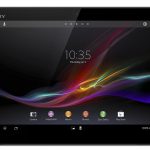
Well, somebody finally announces something that's actually shipping. One of Mobile World Congress' worst traditions is the unveiling of new products not available for months. Today, Sony stepped out from the ranks with the ultrathin, waterproof, Xperia Tablet Z, which goes on sale March 1. That's right, this week! Damn, if only my local Sony store wasn't closed for renovations (until April).
The 10.1-inch tablet stands apart from many of this week's MWC 2013 announcements. Many of the new devices are down-market, offering lower-performance for less money, targeting economy shoppers in mature or emerging locales. By contrast, Xperia Tablet Z packs premium features at premium price.
Could Mobile World Congress 2013 be any more boring?
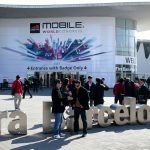
I'm not loving this year's big phone trade show. The news coming out of Barcelona is about as doldrums as the Spanish economy. Generally, the big stuff drops Day 0 and Day 1 at Mobile World Congress. They're done, and so far the product announcements are generally less than last year. The phone launch seemingly everyone waits for, Samsung Galaxy IV, comes in March. That's big commentary on what's missing from MWC 2013.
So far, I would call most new gear as the race to the bottom -- same concepts as the last couple of years, only offering less, selling for less and marketed to less-developed smartphone or tablet markets.
Whoa, you really don't want Google Chromebook Pixel
On February 21, Google started selling its first computer, Chromebook Pixel, which I called a "status symbol" over the weekend. In typical fashion I asked "Will you buy Google Chromebook Pixel?" There surely is a market for the laptop somewhere, but not among the respondents to our poll.
Seventy-seven percent of you answer "No". That's among the highest percentage ever to one of my polls. If there's Chromebook Pixel enthusiasm, it surely isn't from BetaNews readers. Just 8 percent of respondents will buy the Chrome OS laptop "as soon as available in my country". Only 16.5 percent plan to buy Chromebook Pixel ever. So has Google got a flop? No way, Jose.
IT spending shifts from PCs to cloud, smartphones and tablets

Cue the violins. IDC says that the cloud, smartphone and tablet are reshaping IT spending, using the word personal computing defenders despise: "Cannibalization". There's a reason I dismiss the post-PC moniker for cloud-connected device era.
"Cannibalization is happening across the industry" Stephen Minton, IDC vice president, says. "Smartphones have taken over from feature phones, tablet adoption is impacting PC spending, and the cloud is affecting the traditional software, services and infrastructure markets". And you people wonder why Google would make in Chromebook Pixel a high-end cloud computer. It's the future, baby.
Firefox OS races for third place
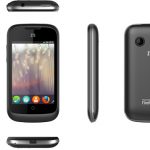
Mozilla means serious business about Firefox OS, if today's Mobile World Congress announcement is any indication. Timing couldn't be more serious. Gartner says there is little room for a third smartphone platform; in fourth quarter, Android and iOS dominated with 90.1 percent share, based on actual sales. The race for third place is on, with BlackBerry and Windows Phone established, but weak, contenders.
Mozilla proposed Firefox OS nearly two years ago, when BlackBerry OS still had appreciable market share and smartphone growth was strong. But as the first Firefox OS devices come to market, much is changed. Mature markets already rapidly saturate, China is the largest for smartphones, feature phone share is expected to fall below 50 percent this year and Samsung has replaced Nokia as global handset leader. The best place for a newcomer, based on who will partner and where there is room to grow: Second-world and emerging markets -- and that's where Firefox OS is headed.
Chromebook Pixel is a status symbol
Google's first computer isn't about sales but status. Critics who lambast Chromebook Pixel as an over-priced web browser wrapped in pretty hardware miss the point. Badly. The laptop will sell, but not in mass-volume because it's not meant to. Is Lamborghini about sales or style? I ask not seeing much commentary about how the Italian sports car is a failure because Ford sells millions more Explorers.
Chromebook Pixel is the luxury car of computers running Chrome OS and perpetually connected to the cloud. Google's beauty is a status symbol for people willing to plunk down $1,299 or $1,449 and makes, along with newer Nexus devices, a bold brand statement: Google is a premium brand and the company a real innovator. For the people who love the brand and want to identify with it, like all those fanboys adoring Apple with their cash, Chromebook Pixel is an easy sell.
Move over iPad mini, Samsung unveils Galaxy Note 8.0
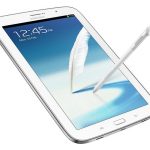
Late February means another Mobile World Congress, and the rush to make big, splashy product announcements before the show starts. Samsung jumped in early today, by announcing an 8-inch tablet with stylus -- Galaxy Note 8.0. The slate is about the same size as Apple's iPad, with comparable screen resolution, but features the S Pen and supporting software. Why just touch and type when you can draw, too?
Samsung's slate joins the Galaxy Note II smartphone and 10-inch tablet, with stylus being the compelling feature that market leader Apple doesn't offer on any iOS device. Like the recent update for its siblings, Galaxy Note 8.0 comes with a split-screen, multi-window function. The tablet runs Android 4.1.2 customized with TouchWiz UI.
Mac malware invades Microsoft, too

How's this for a helluva endorsement for Windows security over OS X? Today, Microsoft acknowledged falling prey to "similar security intrusion" as Apple and Facebook. They got nabbed by a Java exploit affecting Apple's OS.
"We found a small number of computers, including some in our Mac business unit that, were infected by malicious software using techniques similar to those documented by other organizations", says Microsoft security chief Matt Thomlinson.
Expect more-sophisticated Bank DDoS attacks this year

What's the end of February without some scare tactics? Gartner warns that one-quarter of distributed denial of service attacks this year will be against applications. Really? That low? I'm surprised the number isn't higher. After all, as enterprises shore up the network perimeter, HTTP remains open wide enough to drive a freight train through and for that long duration.
The attacks seek to overtax CPUs, disrupt applications and, ultimately, distract IT and security personnel. While they look over there, the bad boys are work over here. Gartner sees DDoS attacks as part of a larger trend singling out financial institutions.
Apple nearly catches up to Samsung in smart-connected device shipments
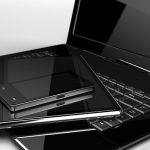
Analysts wouldn't generate new business without something fresh to sell. So they create new categories to tabulate, or dream up strange labels to describe them. Few quarters back, IDC rolled up PCs, smartphones and tablets into the "smart-connected devices" segment. Four things counted separately became something new, which also give schmoes like me something else to write about.
Yesterday, while my heart nearly failed writing about Chromebook Pixel, IDC released numbers for the segment, claiming 28.3 percent growth for fourth quarter and 29.1 percent for all 2012. Samsung nudged ahead of Apple to top the category for the quarter, with slightly wider lead for the year. Considering that smartphones make up 60.1 percent of the segment, the top-five ranking makes sense: Lenovo, HP and Dell follow the leaders. The two bottom-feeders mostly sell PCs, which lost share year over year.
Will you buy Google Chromebook Pixel?
That sound you just heard was Google slapping Apple across the face. Today the search and information giant unveiled and starting selling high-end portable Chromebook Pixel. By just about every measure, Google guns for Apple in its dominant market -- premium PCs, or those selling for $1,000 or more. When rumors circulated about the computer, I opined: "Chromebook Pixel looks like MacBook Pro to me". The impression is stronger now that the real deal is here -- from form factor to price, either $1,299 or $1,449.
Should Apple sweat about Chromebook Pixel? I would. Following a years-long retail trend, Apple share of PCs selling for $1,000 or more was over 90 percent in 2012, according to NPD. Stephen Baker, NPD's vice president of industry analysis, asks if Google is "more trying to compete with Apple and high-end windows machines for premium consumer and maybe corporate?" I answer: Yes. What I want to know: Will you buy Chromebook Pixel? But more importantly: Would you buy Chromebook Pixel instead of 13-inch MacBook Pro?
Chromebook Pixel is Microsoft's worst nightmare come true -- and Apple's, too
The rumors were true! Google developed a touchscreen Chromebook for release this year. Like today! No one should misunderstand what the computer means competitively. Already, four Microsoft Windows partners produce Chromebooks -- Acer, HP, Lenovo and Samsung. Chromebook Pixel promises to do for the Chrome OS platform what Nexus devices did for Android smartphones and tablets: Establish a reference design for hardware partners and provide developers base system to develop apps for the platform. But it's also a competitive move against PCs running OS X or Windows and Google pushing Chrome OS into the premium notebook market.
Today Google unveiled Chromebook Pixel, following weeks of rumors. The company also extended a vision for Chrome OS. Bottom line: Commitment to the operating system is strong. The search and information giant briefed journalists in different cities. I had to turn down an invite to the San Francisco briefing because of family matters. Do I feel left out! But, hey.
PlayStation 4 comes to stores this year
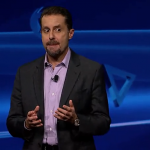
This evening, Sony captured geekdom for two hours, during a live event announcing PlayStation 4. If you're not prostrate on the floor crying like a baby, desperate to get the console now, you must have missed the stream -- or perhaps you're holding out for E3 in a few months and the promise of Xbox 720.
PS4 will go on sale this year -- that's right, holiday 2013. So Microsoft better get its shtick together and have Xbox in stores, too. Consumers will make some hard choices this year about gaming platforms. Whichever, or both, console gaming is going to be a whole lot more exciting come Black Friday.
iPhone 5 outsells Galaxy S III? In your DREAMS
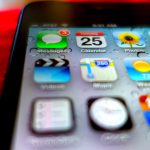
Bloggers the globe over report today -- and you can hear the snickering -- that Apple's flagship handset outsold Samsung's during fourth quarter. That's because Strategy Analytics director Neil Mawston told them so and they didn't really look carefully at the data: "Apple’s iPhone 5 overtook Samsung’s Galaxy S3 to become the world’s best-selling smartphone model for the first time ever in the fourth quarter of 2012".
Tsk. Tsk. Strategy Analytics mixes "bestselling" with "shipments". They are not the same thing. Shipments refer to units going into the channel (carriers and dealers), while sales refer to product purchased by users (businesses and consumers). Only Gartner measures actual phone sales, so why does Mawston use bestselling in one sentence referring to shipments in another?
Joe's Bio
Joe Wilcox is BetaNews executive editor. His motto: Change the rules. Joe is a former CNET News staff writer, JupiterResearch senior analyst, and Ziff Davis Enterprise Microsoft Watch editor.
Ethics Statement© 1998-2025 BetaNews, Inc. All Rights Reserved. About Us - Privacy Policy - Cookie Policy - Sitemap.
